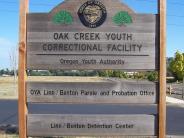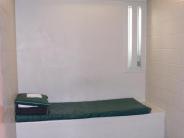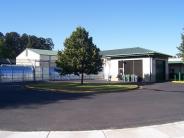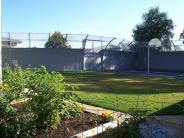Linn-Benton Juvenile Detention Center
Overview
The Linn-Benton Juvenile Detention Center was officially opened on December 15, 1997. It is a 20-bed juvenile detention center in partnership with Benton County, who pays part of the operational costs based upon the number of beds contracted each year, currently 4 beds for the '23-'24 fiscal year. The Linn-Benton Juvenile Detention Center is located in one end of the larger Oak Creek Youth Correctional Facility operated by the Oregon Youth Authority, serving females in need of long term incarceration. Although located in a state building, the Linn-Benton Detention Center is county funded. It is the result of a unique relationship based on partnership and a community need for public safety.
There are three ways that youth come to detention; they can be placed by law enforcement officers under certain statutory requirements; they can be placed in detention by the Court as a result of a hearing, or placed there by a Probation Officer for a probation violation. A Probation Officer supervises all youth released from detention who are placed on a conditional release agreement. They may place youth back in detention if they are found to be in violation of a condition of their release agreement.
Detention is committed to using a balanced approach when working with juveniles. We provide public safety, accountability and opportunities for change. We promote cultural awareness, respect, education and appropriate social skills to the juveniles in our care. Detention is operated by a supportive, consistent team of professionals working toward common goals and objectives. We maintain high standards for staff and provide the juveniles in our care with opportunities for growth and development.
Contact Information
Phone: 541-791-9397
Fax: 541-791-9485
Visitation
Parents or guardians may have a visit within the first 24 hours of a juvenile arriving at detention. You will need to call and schedule the visit ahead of time. All visits are by appointment only.
Medical Consent Form
This form allows legal guardians to give permission for their child, younger than age 15 years, to receive health care while detained at the Linn-Benton Juvenile Detention Center. Juveniles will be involved with organized activity including sports, may receive medications as prescribed, and/or may experience illness during the detention stay; signing this form gives the Linn-Benton Juvenile Detention Medical Clinic Staff permission to assess and provide medical treatment for the child in the event of an emergency. Over the counter medications may be dispensed upon order from medical staff for such things as (including but not limited to): headaches, rashes, or minor abrasions.
Access the Medical Consent Form, fill out the necessary information, including signature, and fax the form to (541) 791-9485. All medical treatment provided to the child is confidential and will not be released to anyone without the written consent of the child.
Orientation Packet
The Detention Center Orientation Packet (Spanish Orientation Packet here) contains rules, rights and expectations for all detained juveniles. During the orientation process, juveniles are given at least two opportunities daily to familiarize themselves with the detention program. Accommodations are made for juveniles with learning disabilities and special needs.
Daily Schedule
While at the facility juveniles participate in education, exercise, daily groups and skill building activities.
Cognitive Restructuring
Cognitive Restructuring is a process of changing thoughts. The goal is to help juveniles overcome risky thinking by bringing them to a level of conscious awareness and replacing the risky thoughts with pro-social positive choices. Detention staff incorporate cognitive restructuring in all areas of programming at the detention center. The goal is to provide detained juveniles with the “tools” needed to change the way they think in and out of detention.
Every juvenile admitted to the detention center completes a “Cost-Benefit Analysis” Form. The juvenile indicates a problem behavior he/she would like to change. The juvenile then identifies long and short term positive and negative consequences for the behavior.
Upon completing the orientation process, each juvenile completes a “Thinking Report” Form. The juvenile identifies a specific instance in which they knew they were in a high risk situation. The juvenile lists their thoughts, feelings and attitudes towards the high risk situation, interventions (things he/she could do as alternatives), and results and outcomes of the situation.
Detained juveniles are allowed to send and receive letters from anyone, unless otherwise ordered by the juvenile court. If a youth receives mail from someone who they are ordered not to have contact with, the mail will be returned to sender. Detained juveniles will be provided 4 stamps a week for personal mail and unlimited postage for communications to the Governor, Attorney General and their attorney. More stamps may be provided by family for their youth. Stamps may be dropped off at the detention center or sent in the mail.
Incoming and outgoing mail is searched for contraband. Examples of contraband are: stickers, drugs, food and inappropriate pictures. Packages and gifts are not allowed.
Mail can be sent to:
(Juvenile's Name)
C/O Linn-Benton Juvenile Detention Center
4400 Lochner Rd SE
Albany, OR 97322
Detention Tours
The Linn-Benton Detention Center provides weekly tours for juveniles 12 years or older, unless approval is given by the Detention Manager or Juvenile Department Director. The purpose of the tour is to provide juveniles an opportunity to see what life in detention is like and to act as a resource for parents. The tours are provided by staff and there is no interaction with juveniles who are currently detained. Detention staff provides juveniles a look at what could happen if they were to violate the law, guide youth through the process of detention, explain to them what happens in detention and will offer guidance to youth who are making poor choices in the community. (View tour times)
https://www.fns.usda.gov/cr/know-your-rights
Follow us on Facebook: Juvenile Department Facebook Page








